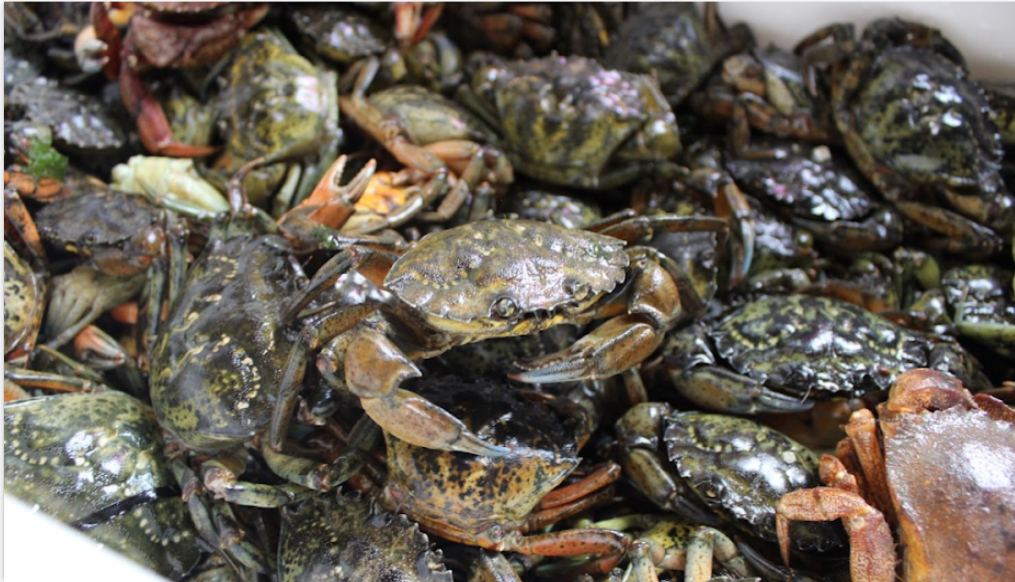FARMINGTON, ME (January 24, 2022)—Eve Fischer, University of Maine at Farmington junior from Portland and a 2020-21 Maine Policy Scholar, recently presented her research study on the resurgence of the invasive European green crab in the Gulf of Maine to the Maine State Legislature. The green crab, despite its small size, is an aggressive predator of native crustaceans and damages eel grass beds that are a critical native marine habitat.

(Left to right) Jesse Minor, UMF assistant professor of Geography and Environmental Planning; Eve Fischer, UMF junior from Portland and UMF 2020-21 Maine Policy Scholar; and Jim Melcher, UMF political science professor and advisor to UMF Policy Scholars
Fischer, majoring in Geography & Environmental Planning, was invited to present her findings to the Maine State Legislature Marine Resources committee on January 11, 2022. At her presentation, she discussed the importance of the Gulf of Maine, how it has supported a long tradition in the seafood industry, the negative impact the invasive green crab is having, and some potential policy solutions Maine could use to control them.
“Being a Maine Policy Scholar is both an honor and a great opportunity,” said Fischer. “Having the chance to present my research findings and policy recommendations to the legislature allows me to connect this important environmental issue with my love for the Maine coast and concern to protect it for the future.”
Fischer’s research showed that while lobsters, clams and other Maine marine crustaceans are negatively impacted by the warming gulf waters, the green crab is resistant to the effects of climate change. Previously, its population remained in check due to the cold Atlantic waters, but the warming of the Gulf of Maine has caused the population to explode.

Invasive European green crabs
Fischer’s research included her findings from her summer 2021 internship with Manomet, a non-profit organization that works across North and South America to create a more sustainable world. During that study, she examined the complex issue of the invasive species, the serious threat it poses to Maine’s valuable marine industries and species, and policies elsewhere that have been developed to manage them.
Fischer learned the crabs could be processed for lump crab meat and soft-shell crabs, which could provide a valuable resource to Maine restaurants. She shared with legislators that the culinary market has the greatest potential value and may be a significant future market for the invasive green crab problem.
“Eve’s work on green crabs is a perfect example of how UMF supports professional development in multiple ways,” said Jesse Minor, UMF assistant professor of Geography and Environmental Planning. “Her summer internship, the Maine Policy Scholarship, serving as a teaching assistant for my Honors First-Year Fusion class, and a semester-long independent study all combined to support her investigations into a real-world environmental problem that is causing real harm to Maine’s marine ecosystems.”
In addition, her research showed that waste streams from crab preparation could be directed into compost and pet food, adding additional value. The crabs can also be used as bait and have the potential for being a resource to create biodegradable plastics.
“Legislators on the Marine Resources Committee have long been aware of the green crab infestation,” said Maine Representative Allison Hepler, member of the legislative committees on Marine Resources and Inland Fisheries and Wildlife. “What Eve’s presentation brought to the table is that there are solutions that need to be considered. Her work highlighted what’s been done in Maine and what’s happening elsewhere. We were all very impressed by her depth of knowledge.”
In examining current policy, Fischer determined that multiple policy actions would be required to support the growth of a green crab fishery.
“Marine resource management will require adjustment, both to preserve existing values and to manage environmental change. Creating markets for underutilized and invasive species such as green crabs is an important part of this policy-based adaptation,” said Fischer.
“For over two decades, the Maine Policy Scholars Program has provided great opportunities for students from all seven University of Maine System schools to research and seek practical solutions for policy issues affecting Maine. Eve’s outstanding work is a shining example,” said Jim Melcher, UMF political science professor and advisor to UMF Policy Scholars. “She’s taken a difficult issue, grasped it from many angles, and has shared her ideas with the Legislature on a solution that benefits many without major costs to the state. I’m proud of her work—it has added to the strong and valuable legacy of many previous Policy Scholars from UMF.”
More on University of Maine at Farmington
A nationally-recognized liberal arts college known for its commitment to student success, UMF provides a challenging yet supportive environment to prepare students for both careers and further study. Rooted in a tradition of teacher preparation, UMF offers top quality programs in the arts and sciences, teacher preparation, and pre-professional studies. Located in the heart of Maine’s four-season outdoor recreational region, UMF is a welcoming, close-knit academic community that prepares students for engaged citizenship, enriching professional careers and an enduring love of learning.
# # #
EDITOR’S NOTE:
Image: https://www.umf.maine.edu/wp-content/uploads/sites/1/2022/01/RP212-029A.jpg
Photo Caption: (Left to right) Jesse Minor, UMF assistant professor of Geography and Environmental Planning; Eve Fischer, UMF junior from Portland and UMF 2020-21 Maine Policy Scholar; and Jim Melcher, UMF political science professor and advisor to UMF Policy Scholars.
Photo Credit: UMF Image
Image: https://www.umf.maine.edu/wp-content/uploads/sites/1/2022/01/RP212-029B.jpeg
Photo Caption: Invasive European green crabs
Photo Credit: UMF Image

